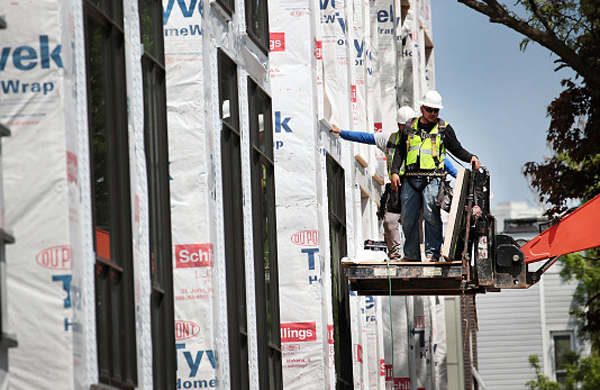- La Feria Community Holds Succesful Business Mixer Event
- Little Nashville to Take Place in Downtown Mercedes
- Lions Basketball Captures District Gold
- La Feria ISD Students Compete in Regional Chess Tournament
- Lions End First Half of 32-4A on a High Note
- La Feria ISD Held Another Successful Parent Conference
- Strong Appearance for Lions at Hidalgo Power Meet
- LFECHS Students Get to Meet Local Actress
- Students Participate in Marine Biology Camp
- Two LFECHS Students Qualify for All-State Band
Lack of Affordable Housing Drives Economic Inequality in Texas
- Updated: August 11, 2017

Construction workers put the finishing touches on new townhouses in Dallas. The high cost of housing is making it difficult for low-income Texans to find an affordable home. Photo: ScottOlson/Getty Images
by Mark Richardson
DALLAS – Despite a boom in home building in the state’s largest cities, advocates say affordable housing for low and middle income Texans is getting harder to find.
Studies show more than 2 million Texas households, mostly those who rent, spend 30 percent or more of their income on housing, and about half of them spend at least 50 percent of their paychecks to keep a roof over their heads.
Advocates say housing costs are the main driver of economic inequality in the state.
Amy Ledbetter Parham, executive director of Habitat for Humanity in Texas, says people without secure housing are more likely to remain in poverty.
Habitat for Humanity builds affordable homes for those in need.
“Virtually every societal ill that Texas faces is impacted positively by stable housing and stable neighborhoods,” Parham states. “From teen pregnancy rates to crime rates to high school completion, we are falling short.”
Parham says studies show fewer families in the five largest Texas metro areas can afford a median priced home or apartment.
In Dallas, 35 percent of homeowners and 52 percent of renters are financially burdened by housing costs, with similar numbers in Austin, San Antonio, Houston and El Paso.
Parham says many builders and elected officials say smaller, less expensive homes and rental properties are just not cost effective to build.
In addition, both the state and federal governments have plans to cut funds for affordable housing programs.
Parham maintains they don’t understand the people who need assistance.
“When I go to the Legislature, I’ve heard people say there aren’t poor people in their district, and I’ve heard people say that working families who need help, you know, that’s a handout, a giveaway program, and that they’re lazy,” she relates. “And that’s just not true.”
Parham says Habitat for Humanity volunteers identify low-income working families who need a home, help them build it and sell it to them at terms they can afford.
“These are the kind of people that take care of your parents when they’re old and your kids when they’re young, they take your groceries to your car, and they’re often invisible,” she stresses. “Just the hardest working people that need one thing to go right.”
Parham says Habitat for Humanity has more than 80 local affiliates across the state that also provide resources, training, neighborhood planning and legislative advocacy.


